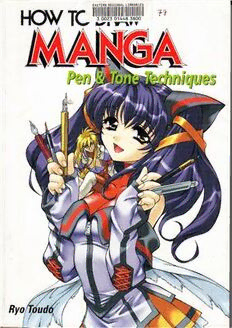
How to Draw Manga Vol. 30: Pen & Tone Techniques PDF
Preview How to Draw Manga Vol. 30: Pen & Tone Techniques
EASTERN REGIONAL LIBRARIES *, l{OS/ TCllfllllflUL{llflUffiUllruUfilll Per: {J#5 Ryo ud I Collect all volumes of the exciting HOW TO DRAW series. FEMALE CHARACTERS ILLUSTRATING BATTLES BISHOUJO PRETTY GALS t5BN4-7661-1 146-X lsBN4-7661 1'147 8 t5BN4-7661 ',t 148-6 I BISHOUJO AROUND THE WORLD OCCULT & HORROR BODIES & ANATOMY lsBN4-7661-1 1 49-4 lsBN4-7661 -1 1 50-8 t5BN4-7661 -1 238 5 l{ot/ToDRAV COUPLES MALE CHARACTERS MAKING ANIME tsBN4 766't-'1241-5 lsBN4-7661-1240-7 tsBN4-7661 -',l 239-3 Distributed by Distributed in Nofih America by NIPPON SHUPPAN HANBAI INC. DIGITAL MANGA DISTRIBUTION 4-3 Kanda Surugadai, 1 1 23 Dominguez St.,Unit'K' 1 Chiyoda-ku, Tokyo Carson CA 90746, U.S.A 1 01 -871 0 Japan Tel: (310) 604-9701 Tel: +81 -(0)3-3233-4083 Fax:(31 0) 604-1 1 34 Fax: +81 -(0)3-3233-41 06 E-mail : [email protected] MECH. DRAWING E-,nail :[email protected].)p URL:http:/www.emanga.com/dmd/ tsBN4-766i-l 334'9 \ 4-. Pen and ?ione Techniques ilTTOIf,lWT*ANGA: hlbEctrrhues lrhb klt|[ClISRyoToudo ktiglr O t!5 Graphic-sha Publishing Co., Ltd. ffiMrcfr* designed and published in 1996 by Graphic-sha publishing co., Ltd. mEgErlrllm was published in 2003 by Hnfn]t.Hring Co., Ltd. ld*fft &drea, Ctriyoda-ku, Tokyo I 02-0073 J apa n lfihdrztlGzuaki Morita ffiffiphrrrclmai mfubArt Color K.K., lC lnc., Ltd., Too Corporation, and Letraset Japan Ltd. HSil-flr logo design: Hideyuki Amemura fiHltrrQurt Reminasu hSmrgm nanagement: Lingua frdnca, lnc. ([email protected]) hiry& lhtumi Nakanish (Graphic-sha publistring Co., Ltd.) htmhrqe edtion project coordinator: Kumiko Sakamoto (Graphic-sha publishing Co., Ltd.) ,Ifilf ranea No part of this publication may be reproduced, tfd in . ra:id sy.:stem, or transmitted in any form or by any means, ffi,dE *:al, photocopying, recording, or otherwise, *r8illFirwitten permission of the publisher hftr5! mgtmfi Distributed in North America by HANBAT tNC. Digital Manga Distribution Ep 1123 Dominguez St., Unit "K' f0[JT-r Carson, CA 90746, U.S.A. Tel: (310)- 604-970'l U{O[.#}3C3B{E h{Ar-re388416 Fax: (310)- 604-1 134 E-mail: [email protected] GrlJ: U R L: http://www.eman ga.com/d m d/ mFimgrAprr2lm i*;m!-Bx h clrE by B}€rbest Printing Co., Ltd A Word about the Book The most basic technical skills required for creating manga are without doubt penning and using screen tone. Even if you suddenly get the idea to draw manga using new materials or software, the original impetus spurring you to create manga in the first place was likely that image of yourself as the artist moving your ink-dipped pen rapidly across the paper, or that image of yourself carefully trimming the screen tone and with all your might pressing it down on the under drawing, or perhaps from that feeling of elation or desire to shout with joy at the image of yourself holding the completed artwork in your ink and glue caked hands after having expended sweat and tears on its creation. This volume is not intended for professional artists, but rather for aspiring manga artists or those manga hobbyists who would like to try their hands at creating themselves. lt offers thorough explanations of pen and screen tone techniques taking a fun and easy-to-understand approach. The author provides invaluable assistance to the readers based upon his lengthy years cf practice as a manga artist and his bountiful experience in instructing aspiring manga artists. We would like to express our gratitude to Art Color K.K. for supplying the specialized art paper for all of the original manga artwork used in this book. We would also like to extend our sincerest thanks to Too Corporation and Art Color K.K. who provided all of the other materials and tools used in the artwork for this book. .) TABLE.OF CONTEI\TS I PenTechniques ....5 MaterialsandTools .....67 Penning ScreenToneTechniques ....11 Tools Screen Tone Materials and .117 lIps Bonus: Tone Etching ...118 Screen Knowing Tone: All About lG . .120 Screentone Knowing Tone: Letraset's .122 Fen Tleehmrqlues * When drawing the background, make an effortto evoke the sense of an inhabited space (i.e. that people actually live in the houses or town y0u are drawing). The telephone wires, curtains, street signs, TV antennas, etc. generate the sense of an inhabited space. Ding dong! I ii/hat suggests inhabitation in this panel is the slightly soiled wall. Tr ngs touched frequently by hands tend to build up grime. I heard he told you /\ that if you really wanted to become ) a manga artist, the Keiko, right? ----,!Hello? first thing you r::::#( I heard you would have to do is ..,,....L were coming study how to use a ,,i:l'.::ll:, from Tashiro ::::::::::::: with editing. t-= -a) c4YY^., Also, let me -1At's correct. introduce to -rank you in a classmate of :Crance for mine, Manabu. -elping us out. I always like to have company with me, so I brought him along. c What suggests inhabitation in this scene is touches like the piled up old newspapers and magazines and the grime on the wall. 7 1 Think carefully about proportions when drawing characters together with a background setting. The desks, bookshelves, chairs, and other objects in this scene all must be drawn in correct proportions. ,l{{ wnrt is a manga artist's studio really like? ls
